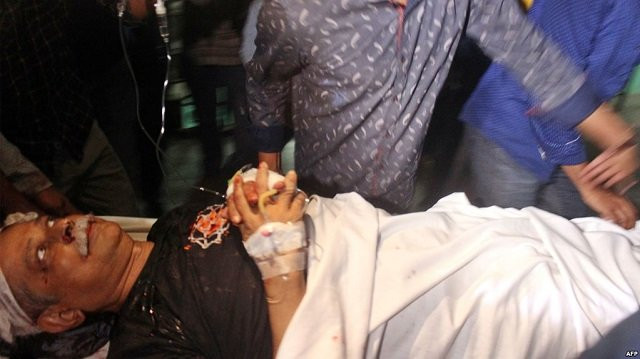Bangladesh police say writer was attacked as 'enemy of Islam'
A young man is accused of stabbing a celebrated secular writer at a seminar

Zafar Iqbal, activist and bestselling science fiction writer lies on a stretcher at Sylhet MAG Osmani Medical College after he was stabbed in the university campus in Sylhet on March 3, 2018 PHOTO: AFP
Saturday's attack on Zafar Iqbal in the northern city of Sylhet was just the latest in a series of stabbings of secular or atheist authors and bloggers in the Muslim-majority country.
Pakistani worker kills boss over sexual harassment in Dubai
Prime Minister Sheikh Hasina, whose government has waged a fierce crackdown on homegrown extremism in recent years, blamed "religious fanatics" for the assault.
Iqbal, a longstanding champion of free speech and secularism, remains in a stable condition after being flown to a military hospital in Dhaka with stab wounds to his head.
Police detained 21-year-old Faizul Hasan, a former madrassa student, and were investigating any ties to the radical groups.
Colonel Ali Haider Azad Ahmed from the elite Rapid Action Battalion unit said Hasan told investigators it was "his duty as a Muslim to resist those who work against Islam".
"He has said Dr Zafar Iqbal is an enemy of Islam," Ahmed said.
Police said Hasan, whose father was a teacher at an Islamic seminary, may have had links to extremists blamed for attacks on secular and atheist writers in the last four years.
Suspected radicals have killed around a dozen such writers and bloggers, including an American atheist blogger of Bangladeshi origin.
Police have blamed homegrown extremist group Ansarullah Bangla Team - also known as Ansar al Islam and linked to al Qaeda in the Indian Subcontinent - for most of the attacks.
The Bangladesh's government has provided security for top secular writers and activists since extremists named them in several lists of targets.
Iqbal, 64, is a bestselling author and celebrity speaker who regularly appears at campuses nationwide. The US-trained professor teaches at a state university in Sylhet.
The attack was swiftly condemned by protesters in Dhaka and Sylhet, who staged torchlit marches and planned further rallies to demand justice later Sunday.
Hasina urged Bangladeshis to remain alert to the threat of extremism.
"Those responsible for these incidents have become religious fanatics," she said Sunday, adding, "They think that they'll go to a heaven, but they will actually go to hell, because no one goes to heaven by killing a human being."
British-Muslim teacher guilty of trying to form 'army' of child terrorists
In recent years Iqbal had supported the execution of party leaders - key opponents of Hasina - for their part in war crimes in the early 1970s, despite allegations the prime minister was crushing dissent.
Bangladesh has been waging a war against extremists in the wake of numerous attacks by radical groups in recent years.
In July 2016, militants stormed a Dhaka cafe and massacred 22 hostages, including 18 foreigners, in an assault claimed by the Islamic State group.



















COMMENTS
Comments are moderated and generally will be posted if they are on-topic and not abusive.
For more information, please see our Comments FAQ